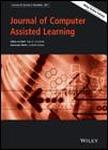版权所有:内蒙古大学图书馆 技术提供:维普资讯• 智图
内蒙古自治区呼和浩特市赛罕区大学西街235号 邮编: 010021

作者机构:Computer Network College of Computer Technology Benghazi Libya Computer Science The Libyan Academy Benghazi Libya Software Engineering Information Technology Faculty University of Benghazi Benghazi Libya Computer Science Information Technology Faculty University of Benghazi Benghazi Libya Graduate Institute of Educational Information and Measurement National Taichung University of Education Taichung City Taiwan Graduate Institute of Digital Learning and Education National Taiwan University of Science and Technology Taipei City Taiwan Yuan Ze University Taoyuan City Taiwan
出 版 物:《Journal of Computer Assisted Learning》 (J. Comput. Assisted Learn.)
年 卷 期:2024年第40卷第4期
页 面:1823-1837页
学科分类:0402[教育学-心理学(可授教育学、理学学位)] 0401[教育学-教育学] 08[工学] 0812[工学-计算机科学与技术(可授工学、理学学位)]
主 题:augmented reality biology education cognitive load learning motivation mobile learning self-efficacy
摘 要:Background: This paper examines the use of augmented reality (AR) as a concept-association tool in schools, with the aim of enhancing primary school students learning outcomes and engagement. Conflicting findings exist in previous studies regarding the cognitive load of AR-enriched learning, with some reporting reduced load and others indicating increased demand and poorer performance. Understanding these implications is essential for effectively leveraging AR in education. The study offers a fresh perspective on the potential of AR technology in improving educational experiences. Objectives: The primary goal of this research was to evaluate the effectiveness of an AR-assisted concept-association strategy for improving essential knowledge acquisition and skills outcomes, increasing cognitive load, and increasing self-efficacy and learning motivation among primary school students. Methods: A quasi-experimental design with a control group was employed to investigate the effectiveness of the intervention. Results and Conclusions: The results demonstrate that the implementation of the AR-assisted concept-association strategy effectively enhanced essential knowledge acquisition and skills outcomes, increased cognitive load, and increased self-efficacy and learning motivation among primary school students. These findings highlight the potential of AR technology to improve the learning experience and engagement of primary school students. The study contributes to the existing literature on the effectiveness of AR technology in education, suggesting future research directions. Ultimately, it offers a practical solution for improving the learning experience by presenting a new approach for teaching using AR technology. © 2024 John Wiley & Sons Ltd.